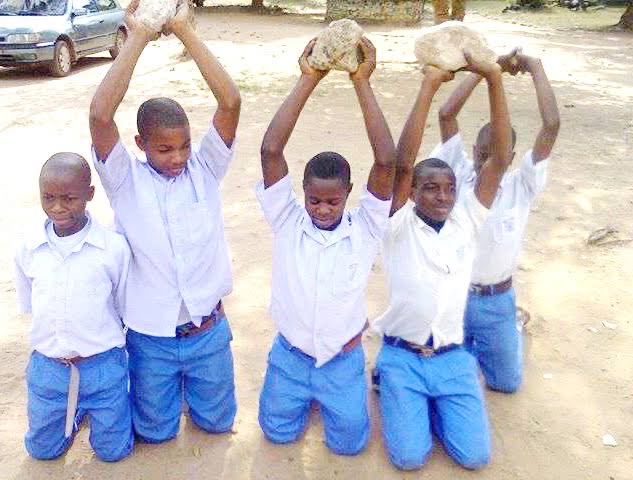Just a few days ago, a certain woman, Mrs Chika Omesi came on social media to decry what she described as injustice against her daughter by a certain reverend father who doubled as the manager of the school her daughter attended. She alleged that the priest had expelled her daughter, Chiamaka Omesi from Mater Amabiis Secondary School , Umuoji , Anambra State over a post she made on the school’s facebook wall. The mother had condemned what she described as ‘child labour’ against her 15 year old daughter who was allegedly made to work on the school’s construction site for three days as punishment for an undisclosed offence she committed in school. She has since sued the school for child labour.
Now, it is common knowledge that school teachers and managers usually employ different kinds of punishment to instill discipline in students under their care. I remember back when I was in secondary school. We used to be asked to uproot tree stumps, cut large expanse of grass and we would do this until our palms peeled. Our parents never intervened.
However, fast forward to when I become a substitute teacher in a mixed school (a school attended by both male and female students), part of the orientation I was given was to vary the corporal punishment I mete out to the sexes. The females were among other things, not to be flogged on the buttocks and and the preferred punishment for them was to cut grass or carry out some kind of sanitation for the school.
To glean the right lessons from this trending incident, one needs to understand what the law says about corporal punishment and indeed punishment to instill discipline in schools. Learners sometimes act in such a way that they endanger both the school setting and the larger society. They are basically persuaded from misbehaving through the use of punishment. This follows that unwanted behaviour is accompanied by a negative reinforcement. Nevertheless, punishment is seen as a wicked act and not appropriate to be used within the school setting. Another opinion may suggest the contrary, that it is appropriate to use punishment in school for corrective measures.
In Nigeria today, there are several forms of corrective measures used in secondary schools, which are often called punishment. Five of such corrective measures that are common are: detention; keeping a defiant student in class or school while others are out, dismissal from class and isolation; sending misbehaving students out of their classrooms or isolating defiant ones who are disorderly from the rest of the class, punishing the group for the offences f one person; punishing the whole class when discovering the particular student who commit the offence prove abortive, corporal punishment; generally not recommended in the school seen as the last resort, and finally, suspension and expulsion; denial of attendance to school activities for a stipulated period of time and when there is no hope of improvement under the school condition, complete withdrawal from the school.
The school system and indeed the larger society hold nothing tangible as regards the reason behind punishment other than deterrence, prevention and reformation. Given that the school system is saddled with the responsibility of transmitting societal values, ideas and skills from the older generation to the younger ones, they tend to justify the use of punishment to deter students from normalizing behaviour patterns which are perceived to be antithetical to the cohesion of the society.
The earlier stated portion of the Nigerian Penal Code that addresses this issue of corporal punishment has it that “nothing is an offence which does not amount to infliction of grievous hurt upon a person and which is done by a parent or guardian for the purpose of correcting his child or ward; that child or ward being under eighteen years of age or, a school master for the purpose of correcting a child under eighteen year of age entrusted to his charge…” It is still a general notion that the value system in the society is eroding and that present day parents are now over protective of their children.
So far, what the said mother is alleging is child labour but it is left for the law to determine the validity of her claim. It behooves on the law court to define what amounts to child labour and punishment within the school setting. ANN will continue to give you update as the said case unfolds.





